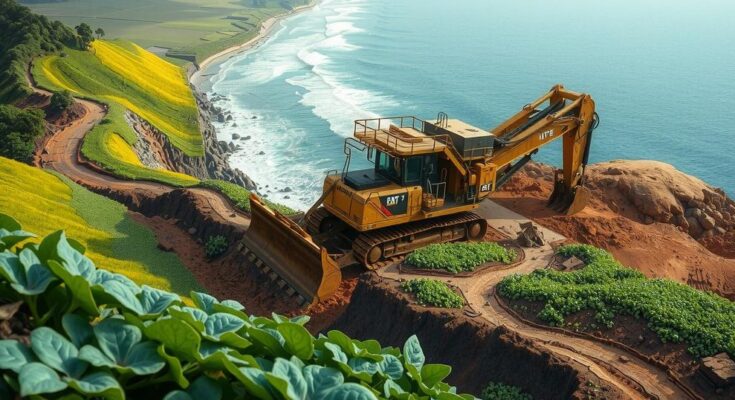The world’s largest mining dredger, operated by Eramet, is devastating the fertile coastal regions of Senegal, displacing local farmers and harming the ecosystem. Despite claims of responsible operations, there are widespread accusations of inadequate compensation and environmental degradation. Senegalese President Faye has called for greater oversight, while communities demand a halt to mining for environmental assessments. The dredger continues to expand its operations amid this growing dispute.
A massive mining dredger, heralded as the largest in the world, is severely damaging Senegal’s fertile coastal area, particularly the region crucial for vegetable cultivation. This operation, visible from space due to its extensive 23-kilometer scar, utilizes an artificial lake to mine zircon, a mineral essential in various industries. This project, managed by the French mining company Eramet, has displaced thousands of farmers and their families in Lompoul, a popular tourist destination.
Eramet insists it conducts its operations responsibly and plans to intensify mining activities, despite local objections regarding environmental destruction. Senegal’s President, Bassirou Diomaye Faye, has recently advocated for more transparency and better oversight of the mining sector, emphasizing the need for local communities to benefit from these activities. This stance marks a significant deviation from the past governance under which Eramet was granted mining rights.
Opponents of the mining project, including displaced farmers, argue that compensation for their lost lands is inadequate and based on outdated policies. The mayor of Diokoul Diawrigne district, Gora Gaye, expressed that the community feels betrayed by broken promises and economic regression.
Many locals have banded together with tourism stakeholders to call for a cessation of mining to assess its impacts. While Eramet claims it has provided adequate housing and infrastructure for displaced families, many argue that these efforts have failed to restore their previous quality of life or livelihoods. Critics point to environmental degradation and polluted water compromising agricultural viability in the region.
In light of the ongoing conflicts surrounding mining operations, Gaye urges the government to halt the project temporarily for thorough environmental assessments. On the other hand, Eramet counters that pausing operations could jeopardize jobs and national economic contributions. Despite the controversy, the dredger continues its operations, further encroaching on the diminishing landscapes of Lompoul.
The mining activities conducted by Eramet have provoked significant backlash from local communities and environmental activists due to displacement, inadequate compensation, and ecological destruction. President Faye’s recent calls for accountability highlight a potential shift in governance, as stakeholders advocate for sustainable practices and a pause in mining operations for environmental review. The situation remains delicate as local residents grapple with the consequences of mining on their livelihoods and environment.
Original Source: www.kpvi.com




